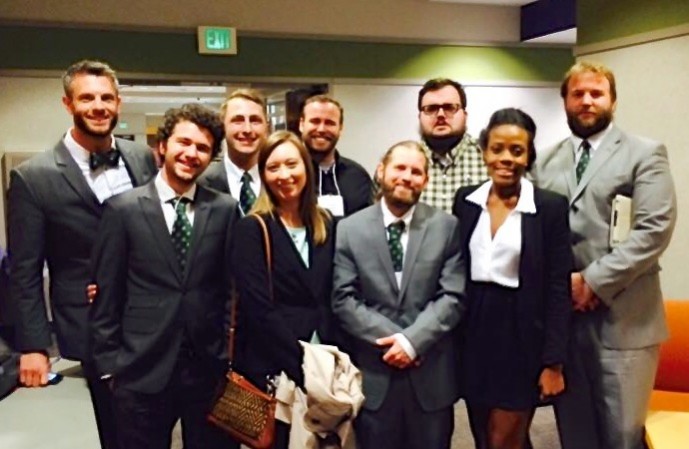In a competition designed to grow students’ knowledge in practical and professional ethics, a UNC Charlotte team placed second in the Regional Ethics Bowl Tournament at Clemson University on November 15, advancing to the national tournament.
“I am so glad that we won this year and had the opportunity to represent our school and our department with a big win,” said assistant coach Ashley Williams. “The win means a lot to us because we were one of the few teams that were made up of all philosophy majors.” Williams, a philosophy major, is marking her third year with the team.
The Intercollegiate Ethics BowlSM gives students a chance to enter an academic competition that combines excitement and fun with an educationally valuable experience. The Association for Practical and Professional Ethics organizes the series of competitions as part of its mission to advance scholarship, education, and practice in practical and professional ethics.
Beth Mason, philosophy instructor and ethics bowl teams coach, said participation is important to help students learn and sharpen skills and abilities that move them forward in life.
“I had participated in a Cross Examination Debate Association debate when I was in college, and it provided me with many rich experiences that shaped the trajectory of my life,” she said. “I see Ethics Bowl competition as valuable in this same way.”
Hundreds of students in teams across the United States and Canada compete in 10 Regional Ethics Bowl competitions each fall.
UNC Charlotte’s team consisted of Williams, assistant coach and two-year participant Lloyd Wymore, and team members Jerry Butler, Michael Haag, Carston Allen and Derek Creason.
Because the team won all three preliminary rounds, it automatically advanced to the semi-final round and was invited to participate in the APPE National Tournament, to be held at the APPE National Conference in Costa Mesa, CA on February 22, 2015.
“Our second team didn’t fare as well, but learned and enjoyed the experience, so that two or three members returning next year can use that experience to our advantage,” Mason said. “Ethics Bowl participation has intrinsic academic value. Participating and competing guarantees out-of-classroom learning experiences that augment and enrich aspects of the university education.”
The teams argue and defend their moral assessment of some of the most troubling and complex ethical issues facing society today.
The competition focuses on selected cases developed by APPE ethics faculty, researchers, and professionals and covers a wide range of disciplines including business, engineering, journalism, law, medicine, and social work. In the competitions, students demonstrate their ability to:
- understand the facts of the case,
- articulate the ethical principles involved in the case,
- present an effective argument on how the case should be resolved,
- and respond effectively to challenges put forth by the opposing team as well as the panel of expert judges.
The team comprised some participants who focused on winning and others who were more focused on developing strong critical arguments, Williams said. The team met twice weekly during ethics bowl class time, at least once a week outside class and sometimes on weekends.
“We were a motley team with different interests, perspectives, and goals,” Williams said. “I’m glad that we could blend those interests to create a wealth of perspectives to argue from, which I believe ultimately helped us win.”
During Williams’ three years with the team, Robin James, a philosophy professor, guided the team the first two years, and Mason took over this year. Both allowed the team to grow independently and with input. “Beth let our team find our way in terms of team dynamics, argumentation style, and practicing outside of class this year,” Williams said.
The Department of Philosophy as well as the Center for Professional and Applied Ethics provided the team with resources. Along with coaching from Mason, team members often met with professors to seek their professional input on the arguments they constructed.
“I firmly believe that every profession seeks people who are articulate and who can think on their feet,” Mason said. “Ethics Bowl participation provides that, along with valuable experiences that bring out the best thinking and work habits in students. I’m proud to see these hard-chargers recognized for all their hard work and effort that extended far beyond our class meeting times.”
Words: Shaina Romain, College Communications Intern
Image: Courtesy of Ashley Williams








